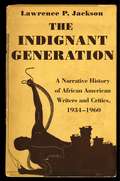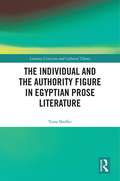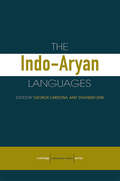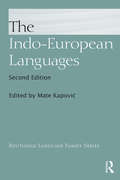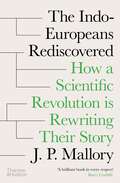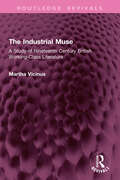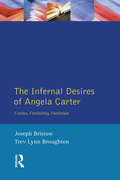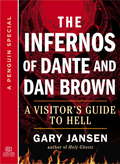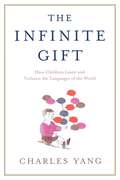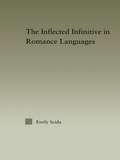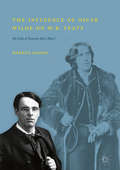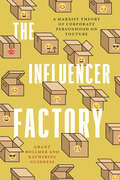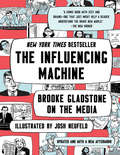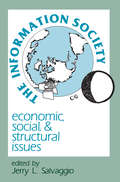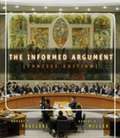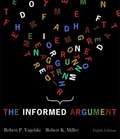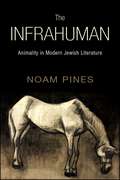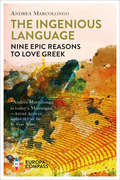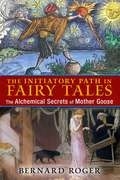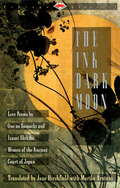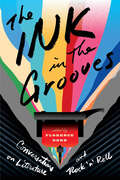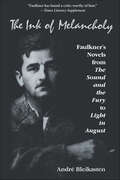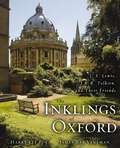- Table View
- List View
The Indignant Generation: A Narrative History of African American Writers and Critics, 1934-1960
by Lawrence P. JacksonThe Indignant Generation is the first narrative history of the neglected but essential period of African American literature between the Harlem Renaissance and the civil rights era. The years between these two indispensable epochs saw the communal rise of Richard Wright, Gwendolyn Brooks, Ralph Ellison, Lorraine Hansberry, James Baldwin, and many other influential black writers. While these individuals have been duly celebrated, little attention has been paid to the political and artistic milieu in which they produced their greatest works. With this commanding study, Lawrence Jackson recalls the lost history of a crucial era. Looking at the tumultuous decades surrounding World War II, Jackson restores the "indignant" quality to a generation of African American writers shaped by Jim Crow segregation, the Great Depression, the growth of American communism, and an international wave of decolonization. He also reveals how artistic collectives in New York, Chicago, and Washington fostered a sense of destiny and belonging among diverse and disenchanted peoples. As Jackson shows through contemporary documents, the years that brought us Their Eyes Were Watching God, Native Son, and Invisible Man also saw the rise of African American literary criticism--by both black and white critics. Fully exploring the cadre of key African American writers who triumphed in spite of segregation, The Indignant Generation paints a vivid portrait of American intellectual and artistic life in the mid-twentieth century.
The Indistinct Human in Renaissance Literature
by Jean E. Feerick Vin NardizziArgues for the necessity of a re-articulation of the differences that separated man from other forms of life. The essays in this collection argue for recognition of the persistently indistinct nature of humans, who cannot be finally divided ontologically or epistemologically from other forms of matter.
The Individual and the Authority Figure in Egyptian Prose Literature (Literary Criticism and Cultural Theory)
by Yona ShefferThe Individual and the Authority Figure in Egyptian Prose Literature explores and analyses political conflicts between individuals and authority figures, as those conflicts are depicted in thirteen Egyptian novels written from 1957 to the last years of Mubarak's presidency. The book discusses the various reasons that lead an individual or a group of people from all strata of society (common people, intellectuals, and public figures) to confront policemen, senior security officials, and even the heads of the state. It further examines how the conflicts develop and what their outcomes are in the short term as well as in the long term, for both the individuals and the authority figures. In this context, the volume also examines the possibility of standing against an oppressive regime and even overcoming it. This text argues that while the authority figure initially subdues individuals who confront them, their victory is short term. In the long term, their cruelties bring about sown deaths, either by the individuals themselves or by their relatives. Furthermore, large assemblies of people can confront the regime with success. These discoveries, along with other findings presented in the book, remain relevant to the reality in the Middle East and the events leading to the Arab Spring.
The Indo-Aryan Languages (Routledge Language Family Ser.)
by Danesh Jain George CardonaThe Indo-Aryan languages are spoken by at least 700 million people throughout India, Pakistan, Bangladesh, Nepal, Sri Lanka and the Maldive Islands. They have a claim to great antiquity, with the earliest Vedic Sanskrit texts dating to the end of the second millennium B.C. With texts in Old Indo-Aryan, Middle Indo-Aryan and Modern Indo-Aryan, this language family supplies a historical documentation of language change over a longer period than any other subgroup of Indo-European. This volume is divided into two main sections dealing with general matters and individual languages. Each chapter on the individual language covers the phonology and grammar (morphology and syntax) of the language and its writing system, and gives the historical background and information concerning the geography of the language and the number of its speakers.
The Indo-European Controversy
by Martin W. Lewis Asya Pereltsvaig Pereltsvaig, Asya and Lewis, Martin W.Over the past decade, a group of prolific and innovative evolutionary biologists has sought to reinvent historical linguistics through the use of phylogenetic and phylogeographical analysis, treating cognates like genes and conceptualizing the spread of languages in terms of the diffusion of viruses. Using these techniques, researchers claim to have located the origin of the Indo-European language family in Neolithic Anatolia, challenging the near-consensus view that it emerged in the grasslands north of the Black Sea thousands of years later. But despite its widespread celebration in the global media, this new approach fails to withstand scrutiny. As languages do not evolve like biological species and do not spread like viruses, the model produces incoherent results, contradicted by the empirical record at every turn. This book asserts that the origin and spread of languages must be examined primarily through the time-tested techniques of linguistic analysis, rather than those of evolutionary biology.
The Indo-European Languages
by Anna Giacalone Ramat Paolo Ramat Mate Kapovi 263The Indo-European Languages presents a comprehensive survey of the individual languages and language subgroups within this language family. With over four hundred languages and dialects and almost three billion native speakers, the Indo-European language family is the largest of the recognized language groups and includes most of the major current languages of Europe, the Iranian plateau and the Indian subcontinent. Written by an international team of experts, this comprehensive, single-volume tome presents in-depth discussions of the historical development and specialized linguistic features of the Indo-European languages. This unique resource remains the ideal reference for advanced undergraduate and postgraduate students of Indo-European linguistics and languages, but also for more experienced researchers looking for an up-to-date survey of separate Indo-European branches. It will be of interest to researchers and anyone with an interest in historical linguistics, linguistic anthropology and language development.
The Indo-Europeans Rediscovered: How a Scientific Revolution is Rewriting Their Story
by J. P. MalloryA lifetime's study brings revealing expertise to an oft-misunderstood topic in human history—the origin and language of the Indo-Europeans. Today the number of native speakers of Indo-European languages across the world is approximated to be over 2.6 billion—about 45 percent of the Earth’s population. Yet the idea that an ancient, prehistoric population in one time and place gave rise to a wide variety of peoples and languages is one with a long and troubled past. In this expansive investigation, based on more than forty years of research, archaeologist J. P. Mallory navigates the complex history of our search for the Indo-European homeland, offering fresh insight into the debates surrounding origin, as well as the latest genetic research. In this compelling account, Mallory explores ancient migrations, linguistics, and archaeology, applying cutting-edge genetic research to untangle the key arguments with wit and verve. He addresses how the controversial idea of a single, shared homeland has been viewed by scientists, archaeologists, and linguists across the past century and reconsiders how, in the case of the Nazis and more recent nationalist movements, they have been manipulated for political advantage. The author goes on to analyze the linguistic trail linking current populations to the Indo-Europeans, looking at Sanskrit, Greek, Latin, and more, as he traces linguistic origins across multiple peoples and cultures, bringing the most up-to-date phylogenetic research to bear on this story. Ultimately this important volume offers the most conclusive and nuanced understanding of an oft-misrepresented and misunderstood topic.
The Industrial Muse: A Study of Nineteenth Century British Working-Class Literature (Routledge Revivals)
by Martha VicinusFirst published in 1974, The Industrial Muse is a study of the literary achievements of the working class. The focus is upon the cultural environment and assumptions of self-educated writers, their literary preoccupations and careers, and the content, form and structure of their writings.This literature must first be considered from the perspective of the working people who read and wrote it, for it functioned in their lives in a number of important ways. Its character was due in large part to the conscious efforts of educated workers who wish to gain cultural recognition along with social and economic justice. It helped to shape individual and class consciousness by giving order to working men's lives and clarifying their relationship with those who held cultural and political power. This literature asserted the autonomy of the working class, but did not posit a new worldview, lest the gains of class solidarity be lost irretrievably. This is an interesting read for scholars and researchers of working-class literature, english literature and working-class history.
The Infernal Desires of Angela Carter: Fiction, Femininity, Feminism (Longman Studies In Twentieth Century Literature)
by Joseph Bristow Trev Lynn BroughtonDrawing on many aspects of contemporary feminist theory, this lively collection of essays assesses Angela Carter's polemical fictions of desire. Carter, renowned for her irreverent wit, was one of the most gifted, subversive, and stylish British writers to emerge in the 1960s.
The Infernos of Dante and Dan Brown
by Gary JansenAn extraordinary journey into the signs and symbols behind Dan Brown's new Robert Langdon thriller, Inferno. Just in time for Dan Brown's new novel, this short guide introduces readers to Dante Alighieri's fourteenth-century epic poem Inferno and explores how Brown uses Dante's imagery and symbols in his latest Robert Langdon thriller. The Infernos of Dante and Dan Brown: A Visitor's Guide to Hell answers the questions and illuminates the facts behind Brown's historical puzzles, cryptic clues, and plot twists. It allows every reader to immerse himself more deeply into Robert Langdon's world. Author Gary Jansen is an independent scholar of Dante's work and a critically acclaimed writer on modern religion. In addition to providing an inside perspective on how Dan Brown uses the uncanny and remarkable themes of Dante, Jansen presents a reliable and engaging overview of the Middle Ages poet and his work. The Infernos of Dante and Dan Brown is an all-around resource into the religious themes, historical secrets, and beguiling imagery behind this breathtaking new thriller.
The Infinite Gift: How Children Learn and Unlearn the Languages of the World
by Charles YangA child's very first word is a miraculous sound, the opening note in a lifelong symphony. Most parents never forget the moment. But that first word is soon followed by a second and a third, and by the age of three, children are typically learning ten new words every day and speaking in complete sentences. The process seems effortless, and for children, it is. But how exactly does it happen? How do children learn language? And why is it so much harder to do later in life?Drawing on cutting-edge developments in biology, neurology, psychology, and linguistics, Charles Yang's The Infinite Gift takes us inside the astonishingly complex but largely subconscious process by which children learn to talk and to understand the spoken word. Yang illuminates the rich mysteries of language: why French newborns already prefer the sound of French to English; why baby-talk, though often unintelligible, makes perfect linguistic sense; why babies born deaf still babble -- but with their hands; why the grammars of some languages may be evolutionarily stronger than others; and why one of the brain's earliest achievements may in fact be its most complex. Yang also puts forth an exciting new theory. Building on Noam Chomsky's notion of a universal grammar -- the idea that every human being is born with an intuitive grasp of grammar -- Yang argues that we learn our native languages in part by unlearning the grammars of all the rest. This means that the next time you hear a child make a grammatical mistake, it may not be a mistake at all; his or her grammar may be perfectly correct in Chinese or Navajo or ancient Greek. This is the brain's way of testing its options as it searches for the local and thus correct grammar -- and then discards all the wrong ones. And we humans, Yang shows, are not the only creatures who learn this way. In fact, learning by unlearning may be an ancient evolutionary mechanism that runs throughout the animal kingdom. Thus, babies learn to talk in much the same way that birds learn to sing. Enlivened by Yang's experiences with his own young son, The Infinite Gift is as charming as it is challenging, as thoughtful as it is thought-provoking. An absorbing read for parents, educators, and anyone who has ever wondered about the origins of that uniquely human gift: our ability to speak and, just as miraculous, to understand one another.
The Inflected Infinitive in Romance Languages (Outstanding Dissertations in Linguistics)
by Emily E. ScidaThis book investigates two prominent issues with regard to the inflected infinitive-the syntactic distribution of the Portuguese inflected infinitive, and its origin and development from Early Romance. The syntactic analysis offered here differs from traditional descriptions of the inflected infinitive in that it uses a theoretical approach to propose one concise condition which predicts all possible occurrences of the Portuguese inflected infinitive within the framework of relational grammar. While the first section of this book offers a synchronic study of the use of the inflected infinitive, the second section examines the theories previously posited to explain its origin and provides additional evidence from Latin and other Romance languages to support the proposal that the inflected infinitive was a historical development rooted in the Latin imperfect subjunctive. This study presents a detailed comparison of the syntactic environments common to both the imperfect subjunctive and the inflected infinitive, and examines the survival of an inflected infinitive in other Romance varieties as well as the existence of other inflected non-finite forms in these languages.
The Influence of Oscar Wilde on W.B. Yeats: "An Echo of Someone Else’s Music"
by Noreen DoodyThis book asserts that Oscar Wilde (1854 – 1900) was a major precursor of W.B. Yeats (1865 – 1939), and shows how Wilde’s image and intellect set in train a powerful influence within Yeats’s creative imagination that remained active throughout the poet’s life. The intellectual concepts, metaphysical speculations and artistic symbols and images which Yeats appropriated from Wilde changed the poet’s perspective and informed the imaginative system of beliefs that Yeats formulated as the basis of his dramatic and poetic work.Section One, 'Influence and Identity' (1888 – 1895), explores the personal relationship of these two writers, their nationality and historical context as factors in influence. Section Two, 'Mask and Image' (1888 – 1917), traces the creative process leading to Yeats’s construction of the antithetical mask, and his ideas on image, in relation to the role of Wilde as his precursor. Finally, 'Salomé: Symbolism, Dance and Theories of Being' (1891 – 1939) concentrates on the immense influence that Wilde’s symbolist play, Salomé, wrought on Yeats’s imaginative work and creative sensibility.
The Influencer Factory: A Marxist Theory of Corporate Personhood on YouTube
by Grant Bollmer Katherine GuinnessInfluencers are more than social media personalities who attract attention for brands, argue Grant Bollmer and Katherine Guinness. They are figures of a new transformation in capitalism, in which the logic of the self is indistinguishable from the logic of the corporation. Influencers are emblematic of what Bollmer and Guinness call the "Corpocene": a moment in capitalism in which individuals achieve the status of living, breathing, talking corporations. Behind the veneer of leisure and indulgence, most influencers are laboring daily, usually for pittance wages, to manufacture a commodity called "the self"—a raw material for brands to use—with the dream of becoming corporations in human form by owning and investing in the products they sell. Refuting the theory that digital labor and economies are immaterial, Bollmer and Guinness search influencer content for evidence of the material infrastructure of capitalism. Each chapter looks to what literally appears in the backgrounds of videos and images: the houses, cars, warehouses, and spaces of the market that point back to the manufacturing and circulation of consumer goods. Demonstrating the material reality of producing the self as a commodity, The Influencer Factory makes a crucial contribution to our understanding of contemporary economic life.
The Influencing Machine (Updated Edition): Brooke Gladstone On The Media
by Josh Neufeld Brooke GladstoneNew York Times Bestseller With a New Afterword “A comic book with zest and brains—one that just might help a reader understand the brave new world.” —The New Yorker A million listeners trust NPR’s Brooke Gladstone to guide them through the complexities of the modern media. Bursting onto the page in vivid comics by acclaimed artist Josh Neufeld, this brilliant radio personality guides us through two millennia of media history, debunking the notion that “The Media” is an external force beyond our control and equipping us to be savvy consumers and shapers of the news. An invaluable introduction to how the media works from one of the acknowledged masters of the industry, this tenth anniversary edition brings the story up to date, with new illustrations and an afterword that offers a deep examination of the rise of social media and the public’s responsibility in a time of division and disinformation.
The Information Society: Economic, Social, and Structural Issues (Routledge Communication Series)
by Jerry L. SalvaggioFirst Published in 1989. Routledge is an imprint of Taylor & Francis, an informa company.
The Informed Argument (Brief 6th Edition)
by Robert K. Miller Robert P. YagelskiFor those who don't want readings, the Brief Edition contains the rhetoric portion of The Informed Argument, 6th edition.
The Informed Argument (Eighth Edition)
by Robert P. Yagelski Robert Keith MillerTreating argument as a problem-solving tool, featuring an innovative marginalia program that contains the contextual information students need to enter thematic conversations, and providing the most extensive coverage of argument in all forms of media, THE INFORMED ARGUMENT is the complete solution for teaching writing and argument.
The Infrahuman: Animality in Modern Jewish Literature (SUNY series in Contemporary Jewish Literature and Culture)
by Noam PinesThe Infrahuman explores a little-known aspect in major works of Jewish literature from the period preceding World War II, in which Jewish writers in German, Hebrew, and Yiddish employed figures of animals in pejorative depictions of Jews and Jewish identity. Such depictions are disturbing because they sometimes rival common anti-Semitic stereotypes, and have often been explained away as symptoms of Jewish self-hatred. In this book, Noam Pines shows how animality emerged in Jewish literature not as a biological or conceptual category, but as a theological figure of exclusion from a state of humanity and Christianity alike. By framing the human-animal question in theological terms rather than in racial-biological terms, writers such as Heinrich Heine, S. Y. Abramovitsh, Hayim Nachman Bialik, Uri Zvi Greenberg, Franz Kafka, S. Y. Agnon, and Paul Celan subjected the pejorative designations of Jewish identity to literary elaboration and to philosophical negotiation.
The Ingenious Language: Nine Epic Reasons to Love Greek
by Andrea MarcolongoAn Italian journalist pleads her case for learning ancient Greek in modern times. For word nerds, language loons, and grammar geeks, an impassioned and informative literary leap into the wonders of the Greek language. Here are nine ways Greek can transform your relationship to time and to those around you, nine reflections on the language of Sappho, Plato, and Thucydides, and its relevance to our lives today, nine chapters that will leave readers with a new passion for a very old language, nine epic reasons to love Greek.The Ingenious Language is a love song dedicated to the language of history&’s greatest poets, philosophers, adventurers, lovers, adulterers, and generals. Greek, as Marcolongo explains in her buoyant and entertaining prose, is unsurpassed in its beauty and expressivity, but it can also offer us new ways of seeing the world and our place in it. She takes readers on an astonishing journey, at the end of which, while it may still be Greek to you, you&’ll have nine reasons to be glad it is. No batteries or prior knowledge of Greek required!Praise for The Ingenious Language&“Andrea Marcolongo is today&’s Montaigne. She possesses an amazing familiarity with the classics combined with the ease and lightness of those who surf the web.&” —André Aciman, New York Times–bestselling author of Find Me&“[Marcolongo&’s] declaration of love for Ancient Greek does more than celebrate the virtues of its grammar, it shows us modern fools how this language can help us understand ourselves better and live a better life.&” —Le Monde (France)
The Initiatory Path in Fairy Tales: The Alchemical Secrets of Mother Goose
by Bernard RogerHidden within age-old classic stories lie the hermetic teachings of alchemy and Freemasonry • Explains how the stages of the Great Work are encoded in both little known and popular stories such as Cinderella, Snow White, and Little Red Riding Hood • Reveals the connection between Mother Goose and important esoteric symbols of the Western Mystery tradition • Demonstrates the ancient lineage of these stories and how they originated as the trigger to push humanity toward higher levels of consciousness In his Mystery of the Cathedrals, the great alchemist Fulcanelli revealed the teachings of the hermetic art encoded in the sculpture and stained glass of the great cathedrals of Europe. What he did for churches, his disciple Bernard Roger does here for fairy tales. Through exhaustive analysis of the stories collected by the Brothers Grimm, Perrault, and others, Roger demonstrates how hermetic ideas, especially those embodied in alchemy and Freemasonry, can be found in fairy tales, including such popular stories as Cinderella, Snow White, Sleeping Beauty, and Little Red Riding Hood as well as the tales attributed to “Mother Goose.” The goose has long been an important esoteric symbol in the Western Mystery tradition. The stories told under the aegis of Mother Goose carry these symbols and secrets, concealed in what hermetic adepts have long called “the language of the birds.” Drawing upon the original versions of fairy tales, not the sanitized accounts made into children’s movies, the author reveals how the tales illustrate each stage of the Great Work and the alchemical iterations required to achieve them. He shows how the common motif of a hero or heroine sent in search of a rare object by a sovereign before their wishes can be granted is analogous to the Masonic quest for the lost tomb of Hiram or the alchemist’s search for the fire needed to perform the Great Work. He also reveals how the hero is always aided by a green bird, which embodies the hermetic understanding of the seed and the fruit. By unveiling the secret teachings within fairy tales, Roger demonstrates the truly ancient lineage of these initiatory stories and how they originated as the trigger to push humanity toward higher levels of consciousness.
The Ink Dark Moon
by Jane Hirshfield Mariko Aratani Izumi Shikibu No Komachi OnoThese translated poems were written by 2 ladies of the Heian court of Japan between the ninth and eleventh centuries A.D. The poems speak intimately of their authors' sexual longing, fulfillment and disillusionment.
The Ink in the Grooves: Conversations on Literature and Rock 'n' Roll
by Florence DoreDrop the record needle on any vinyl album in your collection, then read the first pages of that novel you've been meaning to pick up—the reverberations between them will be impossible to miss. Since Dylan went electric, listening to rock 'n' roll has often been a surprisingly literary experience, and contemporary literature is curiously attuned to the history and beat of popular music. In The Ink in the Grooves, Florence Dore brings together a remarkable array of acclaimed novelists, musicians, and music writers to explore the provocatively creative relationship between musical and literary inspiration: the vitality that writers draw from a three-minute blast of guitars and the poetic insights that musicians find in literary works from Shakespeare to Southern Gothic. Together, the essays and interviews in The Ink in the Grooves provide a backstage pass to the creative processes behind some of the most exciting and influential albums and novels of our time.Contributors: Laura Cantrell, Michael Chabon, Roddy Doyle, Bob Dylan, Steve Earle, William Ferris, Dom Flemons, Rhiannon Giddens, Dave Grohl, Peter Guralnick, Amy Helm, Randall Kenan, Jonathan Lethem, Greil Marcus, Rick Moody, Lorrie Moore, the John Prine band (Dave Jacques, Fats Kaplin, Pat McLaughlin, Jason Wilber), Dana Spiotta, John Jeremiah Sullivan, Richard Thompson, Scott Timberg, Daniel Wallace, Colson Whitehead, Lucinda Williams, Warren Zanes.
The Ink of Melancholy: Faulkner's Novels from The Sound and the Fury to Light in August
by André BleikastenInk of Melancholy re-examines and re-evaluates William Faulkner's work from the late 1920s to the early 1940s, one of his most creative periods. Rather than approach Faulkner's fiction through a prefabricated grid, André Bleikasten concentrates on the texts themselves—on the motivations and circumstances of their composition, on the rich array of their themes, structures, textures, points of emphasis and repetition, as well as their rifts and gaps—while drawing on the resources of philosophy, psychoanalysis, anthropology. Brilliant in its thought and argument, Ink of Melancholy is one of the most insightful and stimulating studies of Faulkner's work.
The Inklings of Oxford: C. S. Lewis, J. R. R. Tolkien, and Their Friends
by Harry Lee Poe James Ray VenemanOxford’s fabled streets echo with the names of such key figures in English history as Edmund Halley, John Wycliffe, and John and Charles Wesley. Of more recent times are those of C. S. Lewis, J. R. R. Tolkien, and the other members of the renowned literary circle to which they belonged, the Inklings. What would it be like to walk this medieval city’s narrow lanes in the company of such giants of Christian literature, to visit Magdalen College, where Lewis and Tolkien read aloud their works-in-progress to their friends, or the Eagle and Child pub, the Inklings’ favorite gathering place? The lavish photography of this book will introduce you to the fascinating world of the Inklings, matching their words to the places where these friends discussed—and argued over—theology, philosophy, ancient Norse myth, and Old Icelandic, while writing stories that were to become classics of the faith. The Inklings of Oxford will deepen your knowledge of and appreciation for this unique set of personalities. The book also features a helpful map section for taking walking tours of Oxford University and its environs.
